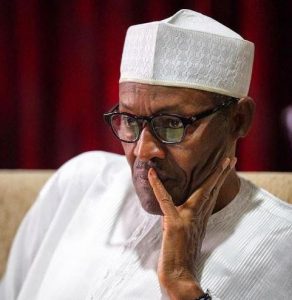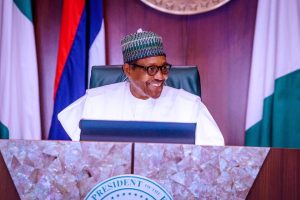
The Guardian / UK: ‘Mystery Of The Missing President Fuels Political Intrigue In Nigeria’ By Emmanuel Akinwotu and Ruth Maclean
Nigeria’s ailing president has not been seen in two months and has spent over a third of the year so far abroad, with no known plans to return.
More than a month since the two-year midpoint of his presidency, Muhammadu Buhari is still in London receiving treatment for a mystery illness that many believe to be cancer.
His aides refuse to say what is wrong with him, and on his last trip back to Nigeria, Buhari said only that he had never been so sick, and hinted that he had received a blood transfusion.
The president’s spokesman, Garba Shehu, refused a request from the Guardian this week to comment on Buhari’s whereabouts.
The first lady, Aisha Buhari, reassured Nigerians that her husband was “recuperating fast” in June, on her return from a week-long visit to London, but did not share any pictures of her husband like the ones published after an earlier visit. She left again for London last week.
The 74-year-old president came to power in 2015 promising to fight endemic corruption and Boko Haram, the Islamist group that has rampaged through Nigeria’s north-east.
Buhari has ruled the country once before, having taken power in a military coup in the 1980s. He was deposed in another coup, but when he came to power for the second time in 2015 he was hailed as a scrupulously honest man and a strong hand who would deal efficiently with Nigeria’s problems.
However, his long absences have left Nigerian politics beset with rumour and political power play, on edge and uncertain.
His first trip to the UK was presented by his spokesman as nothing to provoke concern: Buhari was “holidaying” and taking “routine medical tests”, the spokesman said.
But on his return to Nigeria in March Buhari admitted he had been seriously ill and only partly reassumed his presidential duties.
When 82 of the Chibok schoolgirls kidnapped by Boko Haram were released in a prisoner exchange in May, Buhari stayed in Abuja only long enough for a photoshoot with them, flying back to London the same night for more care.
This time there was no timeframe as to when he would return. His wife has insisted he is “not as ill as is perceived”. Since then there has been a reel of written statements by the presidency, quoting Buhari’s condolences for deceased figures, his recommendations and sentiments. But without the customary public appearances, these have only emphasised his absence.
An audio clip of Buhari’s message to Muslims, spoken in Hausa, was released for Eid celebrations, but in it his voice was notably weak.
The effect of the reluctance to tell Nigerians the truth about their president’s condition has fuelled rumour and uncertainty. Even senior figures in the ruling All Progressives Congress (APC) party are increasingly speculating over the severity of Buhari’s illness and whether he can remain a viable leader. Suspicions that there is an attempt to control who takes power after Buhari are constant.
In May, Bola Tinubu, the APC leader, called on the army to prevent any attempted coup after reports that a group of military officials were aligning with certain politicians.
Buhari’s illness is being cast as a return to the past for Nigeria. Umaru Yar’Adua, a northern Muslim professor who became president in 2007, was absent for months, with the government of the time refusing to give details about his condition until he finally died in 2010.
Many see the prolonged absence of another ill and aged leader as a precursor to a power play like the one that followed Yar’Adua’s death.
Presidential candidates are expected to alternate between northern and southern leaders, a key destabilising factor in Nigeria’s politics, which is often dominated by regions, ethnicity and religion. Should Buhari be unable to finish his term, his popular vice-president, Yemi Osinbajo, a Christian from the south-west, would be constitutionally mandated to succeed him. Yet that would only be the starting gun for political tussles.
Meanwhile, the country’s challenges continue to mount. Over three years after they were kidnapped, 113 of the 276 Chibok girls remain missing, along with thousands of others who have also been abducted. Despite progress in suppressing Boko Haram’s occupation of urban territory, the group remains a threat, with attacks in rural areas increasing in the last few months.
The resulting humanitarian crisis in the country’s north-east has worsened over the last two years.
The economy has been in recession for over a year, with the fall in oil prices damaging to Nigeria’s oil-reliant economy. Unemployment has risen and businesses have found it hard to import goods due to tougher foreign exchange rules. The government has made a concerted effort to diversify the economy, making the agriculture sector more productive and profitable. There has also been a mass recovery of looted public funds and new social investment programmes.
Reports of corruption by figures in Buhari’s own government, as well as criticisms of his anti-corruption campaign, have further diminished his support.


